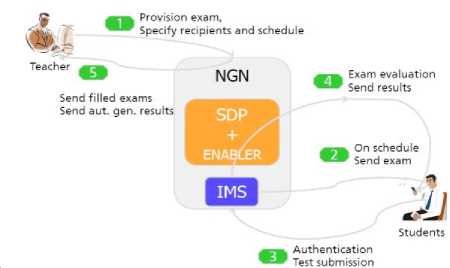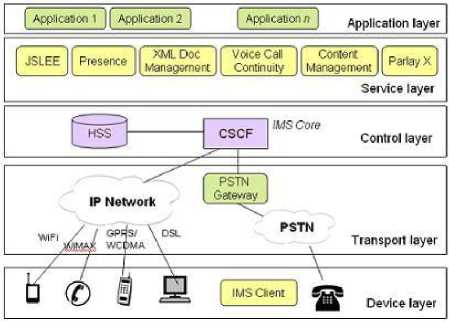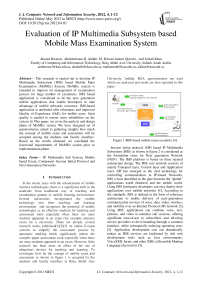Evaluation of IP Multimedia Subsystem based Mobile Mass Examination System
Автор: Ahmed Barnawi, Abdulrahman H. Altalhi, M. Rizwan Jameel Qureshi, Asif Irshad Khan
Журнал: International Journal of Computer Network and Information Security(IJCNIS) @ijcnis
Статья в выпуске: 4 vol.4, 2012 года.
Бесплатный доступ
This research is carried out to develop IP Multimedia Subsystem (IMS) based Mobile Mass Examination (MoMEx) System. MoMEx system is intended to improve on management of examination process for large number of examinees. IMS based application is considered to be the next generation mobile applications that enable developers to take advantage of mobile networks resources. IMS-based application is attributed with robustness and improved Quality of Experience (OoE) for mobile users. Such quality is needed to ensure users reliabilities on the system. In This paper, we cover the analysis and design phase of MoMEx system. We have designed set of questionnaires aimed to gathering insights how much the concept of mobile exam and assessment will be accepted among the students and faculty members. Based on the results obtained, we concluded the functional requirements of MoMEx system prior to implementation phase.
IP Multimedia Sub System, Mobile based Exam, Component Session Initial Protocol, Next Generation Networks
Короткий адрес: https://sciup.org/15011071
IDR: 15011071
Текст научной статьи Evaluation of IP Multimedia Subsystem based Mobile Mass Examination System
Published Online May 2012 in MECS
In the recent years with the advancement of mobile wireless technologies, there is a significant shift in the academic from traditional way of teaching and examination pattern to mobile learning environment. Several universities incorporated the mobile technology into their teaching and learning environment and recognizes the potential of mobile technologies as an effective medium for teaching and assessment tools especially when there are mass students appeared in an exam (for example entrance exam for a university. There are already several research works published[1][2][3] on online E-exam systems to simplify the assessment process by automatic marking which significantly reduce the complex paper assessment work especially when there are mass students appeared in an exam. However, little research has been done on effect of the use of ubiquitous devices for teaching and learning. To investigate how far the concept of mobile exam and assessment as shown in figure 1 is accepted by the students and faculty members in King Abdul Aziz
University, Jeddah, KSA, questionnaires are used which are analyzed and result are then reported in this paper.

Figure 1 IMS-based mobile exam scemniro [4]
Session initial protocol (SIP) based IP Multimedia Subsystem (IMS) as shown in figure 2 is considered as the foundation stone for Next generation Network (NGN). The IMS platform is based on three layered architecture design, The IMS core network consists of mainly Transport layer, Control layer and Application layer. SIP has emerged as the vital technology for controlling communication in IP-based Networks. IMS is best described as the glue between the “global” applications world (Internet) and the mobile world. Using IMS third party developers can easy deploy their applications over mobile networks [4]. According to the standards, IMS is defined in the form of reference architecture to enable delivery of next-generation communication services of voice, data, video, wireless, and mobility over an Internet Protocol (IP) network [5]. Using IMS, applications can combine voice, text, pictures, and video in seamless call sessions, offering significant ease-of-use to subscribers and allowing service providers to drive branding through a common interface, while substantially reducing operating costs [5]. Application development cost can dramatically reduce as IMS services are facilitated by rich web development tools such as Java environments, VoiceXML forms, and other XML (eXtensible Markup Language) derivatives [5].

Figure 2. IMS architectural diagram Source [18]
Component based development (CBD) is ideal choices for developing mobile application, as CBD model encourage assemblies of components for systems development instead of building everything from scratch. CBD technologies comprised of implementing a component into a system through its well defined interfaces [6]. Using well-defined interfaces, a component interact with other components to accomplish a partial function of the system.
The inner structure of the component and the implementation of the interfaces are hidden to the outside. Therefore, CBSE enables a distributed and independent development of components as well as a straightforward replacement of a component by a different component in large-scale systems [7]. CBD support the development of components as reusable entities and software developers need not to reinvent the wheel if wheel is already available in the market which helps in reducing the software development time and cost as well.
We apply this model on Mobile Mass Examination (MoMEx) system that is an application attracting the interest of educational authorities around the world due to its potential convenience. MoMEx also includes an activity management application for the faculty that allows them to control the examination process in real time and to view all student data.
The paper is organized as follows: sections II covers related work Section III illustrates Case Study. Section IV contains the evaluation Section V contains Functionality recommendation for MoMEx system after analyzing students and faculty questionnaire and Section VI conclusion and future work.
II Related Work
In order to know the usage of smart phone in universities to support education, authors [8] designed and implemented several mobile based educational services at VaÈxjoÈ University. The aim of the research is to know which content and services could be delivered to the smart phones for learning and communication in context of university studies, In their project 41 students from two different courses participated for a period of three months, a survey was conducted to know the support of the services provided on smart phone, results indicated that students perceived the services as useful to learning; interestingly, and helpful in their learning. In the paper the author [8] recommended mobile services to be implemented in higher education to improve the usability, institutional support and tailored educational content purposes.
The author [9] in his research finds the state of art tools and benefits of mobile wireless technology usage in higher education across the globe. Three popular mobile wireless technologies are used in higher education and identified that each one requires different technical infrastructure to access to network resources, the three technologies they explored were wireless computers, PDAs, and web-enabled mobile phones. Issues related to each three technologies must be study before it implemented in the higher education and one such issue is security. How to achieve educational goals administrators, educators, and students must think critically to determine how to use the new technologies without it is virtually impossible to study any subject of mobile wireless technologies in higher education [9].
Most of the Mobile Learning Applications uses multimedia data such as video clips, images and documents, the authors [8] in their research analyzed and investigated for a need of fast and reliable data storage and retrieval. [10] proposed a Database Management Architecture for an Innovative Evaluation System based on Mobile Learning Applications for faster data storage and retrieval. Emphases of the investigation were for high throughput so as to support multimedia for Mobile Learning Applications development.
Список литературы Evaluation of IP Multimedia Subsystem based Mobile Mass Examination System
- Y. Zhenming, Z. Liang and Z. Guohua. A Novel Web-Based Online Examination System for Comp. Science Education. In 33rd ASEE/IEEE Frontiers Education Conf., S3F-7-S3F-10, 2003.
- Magdi Z. R., Mahmoud S. K., Ahmed E. H., and Mahmoud A. Z. An Arabic Web-Based Exam Management System, In International Journal of Electrical & Computer Sciences IJECS-IJENS Vol: 10 No: 01, 2008.
- Yuan Zhenming, Zhang Liang, Zhan Guohua. A Novel Web-Based Online Examination System for Computer Science Education. In 26rd ASEE/IEEE Frontiers Education Conference, S3F-7-S3F-10. 2003
- A. Barnawi, Nadine A, M. Emran and Asif I. Khan. Deploying SIP-based Mobile Exam Application onto Next Generation Network testbed. In first Saudi International Electronics, Communications and Electronics Conference (SIECPC'11), KSA. . 2011.
- James Wright. The Architecture and Benefits of IMS. Dialogic Corporation, Retrieved on November 18th 2011 from http://www.konnetic.com/Documents/KonneticIMSServicesAndRevenue.pdf
- H. Hansson, M. Åkerholm, I. Crnkovic, M. Törngren. SaveCCM – a Component Model for Safety-Critical Real-Time Systems. In Proceedings of the 30th EUROMICRO Conference (EUROMICRO’04), France, 2004.
- Research Areas of the Software Engineering Group, Retrieved on November 18th 2011 from, http://www.cs.uni-paderborn.de/en/research-group/software-engineering/research/research-areas.html
- MARCELO MILRAD1 and MICHELE H. JACKSON. Designing and Implementing Educational Mobile Services in University Classrooms Using Smart Phones and Cellular Networks. In Int. J. Engng Ed. Vol. 24, No. 1, p. 84±91, 2008
- Kim, S.H., Mims, C., & Holmes, K.P. An introduction to current trends and benefits of mobile wireless technology use in higher education. In AACE Journal, 14(1), p. 77-100, 2006.
- Lu, Joan, Sundaram, Aswin, Zhaozong, Meng, Arumugam, Vidyapriyadarshini and Gehao, Lu. Mobile Exam System – MES: Architecture for Database Management. In The International Conference on Education & Learning in Mobile Age - CELMA, Lake District, United Kingdom. June 1-2, 2011.
- GUO Ping, ZHANG Hai-yan, DENG Yi-wen. The Design and Implementation of Online Scoring System. In IEEE School of Computer Science, Chongqing University, Chongqing, 400044, China, 2009.
- ZhaozongMeng and Joan Lu. Implementing the Emerging Mobile Technologies in Facilitating Mobile Exam System. In 2nd International Conference on Networking and Information Technology IPCSIT, IACSIT Press, Singapore, vol.17, 2011.
- Michal Jiang and Zhihua Yang. A Component-Based Service Framework for Mobile Applications. In The 2006 International Conference on Information Reuse and Integration, Waikoloa Village, HI, p. 307-312, 2006,
- Im,T.S. Component based programming in mobile devices: The future of mobile device development? . In Inst Informatics &Systemic, p. 255-259, 2004.
- Maria Is Po., SIP-based Applications in UMTS: A Performance Analysis, Fifth European Wireless Conference, Mobile and Wireless Systems beyond 3G, Barcelona, Spain, 2004.
- I. Markota, I. Ćubić.. Medical Sensor Application Framework Based on IMS/SIP Platform. In Research & Development Centre, Ericsson Nikola Tesla d.d. Croatia
- Gonzalo Camarillo and Miguel A. The 3G IP Multimedia Subsystem (IMS) Merging the Internet and the Cellular Worlds. In John Wiley & Sons, Ltd. Publisher.
- Sike Huang. Mobile Telemedicine System based on IMS/SIP platform, Stockholm, Sweden, page 9-10, 2009, Retrieved June 20th 2011 from http://web.it.kth.se/~johanmon/theses/huang.pdf


